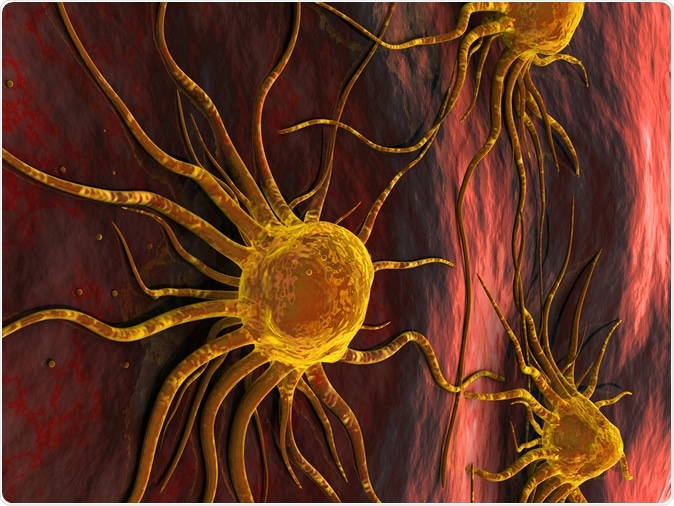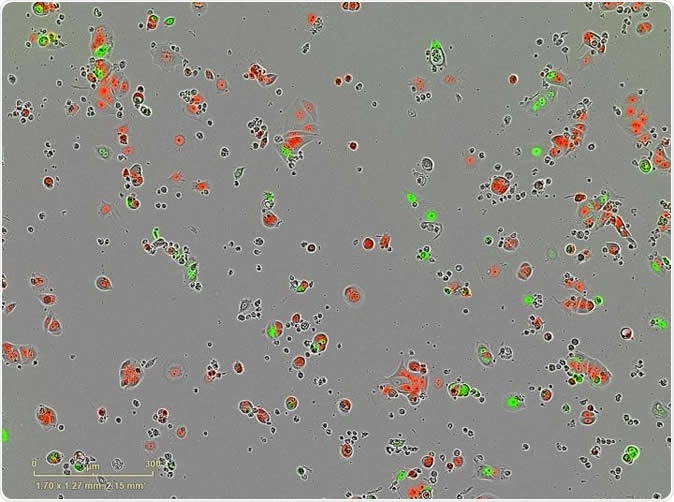Breast cancer is one of the most aggressive types of cancers in the world. It is the commonest cause of cancer death in women worldwide, and it represented about 12 percent of all new cancer cases in 2012. Current predictions and statistics suggest that both worldwide incidence of breast cancer and related mortality are on the rise. Globally, breast cancer now represents one in four of all cancers in women.

Breast Cancer Cells. Image Credit: Ancroft / Shutterstock
In the United States, breast cancer death rates are higher than those for any other cancers, besides lung cancer. In 2019, it is projected that approximately 30 percent of newly diagnosed cancers in women will be breast cancer.
Another factor that makes breast cancer a scary condition is that it can recur, even after initial treatment. Recurrent breast cancer is a type of breast cancer that comes back after being treated. After treatment, there are undetected cancer cells lurking in the breast tissue that may have evaded treatment. These undetected cells may multiply, and in the second time around, they become stronger and resistant.
Cancer cells can become dormant for a long time
In a new study published in the journal Nature Communications, a team of researchers at the Imperial College London studied human breast cancer cells in the laboratory and found that these cells could go into sleep mode, becoming dormant until such time it is triggered to attack again.

Breast cancer sleeper cells: Dormant 'sleeper' cells (red) and active cancer cells (green). Image Credit: Luca Magnani et al. Nature Communications 2019
The team examined and studied a group of breast cancer drugs dubbed as hormone treatments. They hope their discovery could open the door for future treatments that would make the cancer cells become dormant for longer, or even finding a way to wake up the cells so they can be killed by the treatment.
“For a long time, scientists have debated whether hormone therapies - which are a very effective treatment and save millions of lives - work by killing breast cancer cells or whether the drugs flip them into a dormant 'sleeper' state,” Dr. Luca Magnani, research author from Imperial’s Department of Surgery and Cancer.
“This is an important question as hormone treatments are used on the majority of breast cancers. Our findings suggest the drugs may kill some cells and switch others into this sleeper state. If we can unlock the secrets of these dormant cells, we may be able to find a way of preventing cancer coming back, either by holding the cells in permanent sleep mode, or be waking them up and killing them,” she added.
Clues from ‘Sleeper Cells’
The researchers studied about 50,000 human breast cancer single cells in the laboratory. The findings showed that applying a treatment like a hormone therapy exposed a small portion of the cells as being in a dormant state. Studying these “sleeper cells” could provide new clues and information on why breast cancer cells become resistant to some treatments. As a result, the drugs stop working and triggering a relapse.
Breast cancer treatments include surgery, radiation therapy, chemotherapy, and hormonal therapy. Hormonal therapies are utilized to treat a breast cancer type called oestrogen-receptor positive, account for more than 70 percent of all breast cancers. This type of cancer is fueled by estrogen, a female hormone.
Initially, breast cancers are treated with surgery to remove the tumor then followed by a series of chemotherapy or targeted hormone therapy, which target estrogen receptors. However, doctors see that about 30 percent of patients with breast cancer undergoing hormone therapies experience a relapse, or have recurrent breast cancer, which is harder to treat.
Usually, returning cancers are metastatic and aggressive, which means they can spread throughout the body, and most of them are resistant to current available treatments.
In a previous study by the same team of researchers, they found why breast cancer cells become resistant to hormone therapy, and they suggest that cells can create their own “fuel”, letting them prevent being starved by cancer treatment. With the current study, it provided additional clues in this phenomenon.
“These sleeper cells seem to be an intermediate stage to the cells becoming resistant to the cancer drugs. The findings also suggest the drugs trigger the cancer cells to enter this sleeper state,” explained Dr. Iros Barozzi, study co-author and a doctor in the Department of Surgery and Cancer.
He added that the experiments provided new information about sleeper cells. They found that these cells are more likely to travel throughout the body, and they can even wake up in other organs. As a result, they can cause secondary cancers.
“However, we still don't know how these cells switch themselves into sleep mode - and what would cause them to wake up. These are questions that need to be addressed with further research,” he added.
The team, however, emphasized that hormone therapy is still one of the most effective treatments for breast cancer. Further treatment is important to determine if it’s possible for patients to take the treatment long after initial cancer cure to prevent the cancer cells from awakening.
Journal reference:
Hong, S., Chan, T., Lombardo, Y., Corleone, G., Rotmensz, N., Rocca, A., Pruneri, G., McEwen, K., Coombes, R.C., Barozzi, I., and Magnani, L. (2019). Single-cell transcriptomics reveals multi-step adaptations to endocrine therapy. Nature Communications. https://www.nature.com/articles/s41467-019-11721-9, https://www.nature.com/articles/s41467-019-11721-9